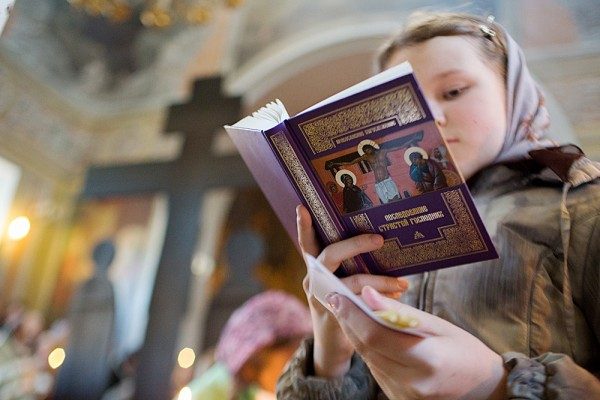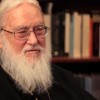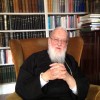Saint Silouan’s burning desire and constant prayer was for the salvation of the whole world. “Love all creation”, says Starets Zosima in Fyodor Dostoevsky’s novel The Brothers Karamazov. “Love all creation, the whole of it and every grain sand within it. Love every leaf, every ray of God’s light. Love the animals, love the plants, love everything. If you love everything you will perceive the divine mystery in things”.
The ‘divine mystery’ of which Staretz Zosima speaks is precisely the interdependence, the reciprocal coherence, of all created things in God. Everything, like the ocean, flows and enters into contact with everything else: touch one place, and you set up a movement at the other end of the world.
Such is Dostoevsky’s vision of cosmic unity. The created world constitutes individual whole, and so the salvation of each individual person is inextricably bound up with the salvation of all mankind and, yet more widely, with the salvation of the entire universe. ‘We are members of one another’ (Eph 4:25) needs to be given the broadest possible application. It is not only we humans who depend on each other as the limbs of a single body; but we have bonds of kinship with the animals as well, and also with trees and plants, air and water. We live in them and they in us.
Precisely the same sense of cosmic unity is expressed by Saint Silouan the Athonite: “He who has the Holy Spirit in him, to however slight a degree, sorrows day and night for all mankind. His heart is filled with pity for all God’s creatures, more especially for those who do not know God, or who resist Him and therefore are bound for torment. For them, more than himself, he prays day and night, that all may repent and know the Lord”.
Archimandrite Sophrony, in his book on Staretz Silouan , sums up the teaching of the Staretz on cosmic coherence in these words: “The life of the spiritual world, the Staretz recognized as one life and because of this unity every spiritual phenomenon inevitably reacts on the state of the whole spiritual world.”
Despite the striking parallels between the Russian novelist and the Athonite monk, it is highly unlikely that Saint Silouan had ever read Dostoevsky. More probably, the similarities arise because both are shaped by the same living tradition and both are drawing on the same sources. Saint Isaac the Syrian, who writes in a famous passage of the Ascetical Homilies: “What is a merciful heart? It is a heart for the whole of creation for humanity, for the birds, for the animals, for demons, and for every created thing. At the recollection and at the sight of them such a person’s eyes overflow with tears owing to the vehemence of the compassion which grips his heart: as a result of his deep mercy his heart shrinks and cannot bear to hear or look on any injury or the slightest suffering of anything in creation. This is why he constantly offers up prayer full of tears, even for the irrational animals and enemies of truth, even for those who harm him, so that they may be protected and find mercy”.
What exactly does Staretz Silouan mean when faithful to the teaching of Saint Isaac, he affirms that the Saints “embrace the whole world, with their love?” Let us note the all-embracing love and prayer that constitute our true vocation as human persons. There is first his firm conviction that God calls every human being to salvation. Secondly, there is his conception of the “total Adam” and, linked with this, his insistence that my neighbor is myself. Thirdly, there is his firm assurance that in God’s total plan it is not only human beings but the entire cosmos that is to be redeemed and transfigured.
“It was particularly characteristic of Staretz Silouan to pray for the dead suffering in the Hell of separation from God”, writes Father Sophrony and he goes to recall an exchange that he overheard between the Staretz and a hermit:
I remember a conversation between him and a certain hermit, who declared with evident satisfaction, “God will punish all atheists. They will burn in everlasting fire”. Obviously upset, the Staretz said: ‘Tell me, supposing you went to Paradise and then looked down and saw somebody burning in Hellfire – would you feel happy?’ ‘It can’t be helped. It would be their own fault,’ replied the hermit. The Staretz answered him with a sorrowful countenance: ‘Love could not bear that,’ he said. ‘We must pray for all!’
The fact that God desires the salvation of all does not mean of course that our salvation is automatic and inevitable. As the Letter to Diognetus states, “God persuades, He does not compel, for violence is foreign to Him. God’s call to salvation comes in the form of an invitation, which we on the human side are free to accept or to reject. But, although the response varies, the call is universal.
What is a merciful heart? It is a heart for the whole of creation for humanity, for the birds, for the animals, for demons, and for every created thing.
“Dwelling in heaven, the Saints behold Hell and embrace it too in their love”. This is possible for them, because the love that is at work in their hearts is nothing else than the love of God Himself, and God’s love is present everywhere – even in hell. God is present in hell, too, as love…Even in hell Divine Love will embrace all men, but, while the love is joy and life for them that love God, it is torment for those who hate Him.
In the words of Vladimir Lossky, “The love of God will be an intolerable torment for those who have not acquired it within themselves.”
In the teaching that the power of love extends even to Hell, the Staretz is once more following Saint Isaac the Syrian who writes: “Even those who are punished in Gehenna are tormented with the scourging of love. The scourges that result from love – that is, the scourges of those who realize that they have sinned against love – are harder and more bitter than the torments which result from fear… The power of love works in two ways: it torments those who have sinned, just as happens here on earth; but those who have observed its duties, love gives delight. So it is in Gehenna: the contrition that comes from love is the harsh torment; but in the case of the sons of Heaven, delight in this love inebriates their souls.”

















